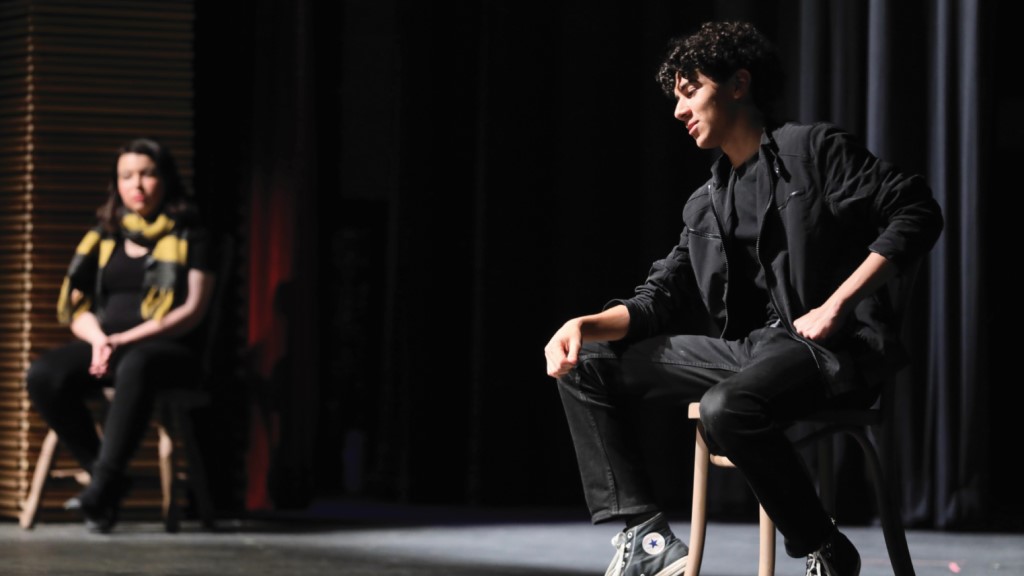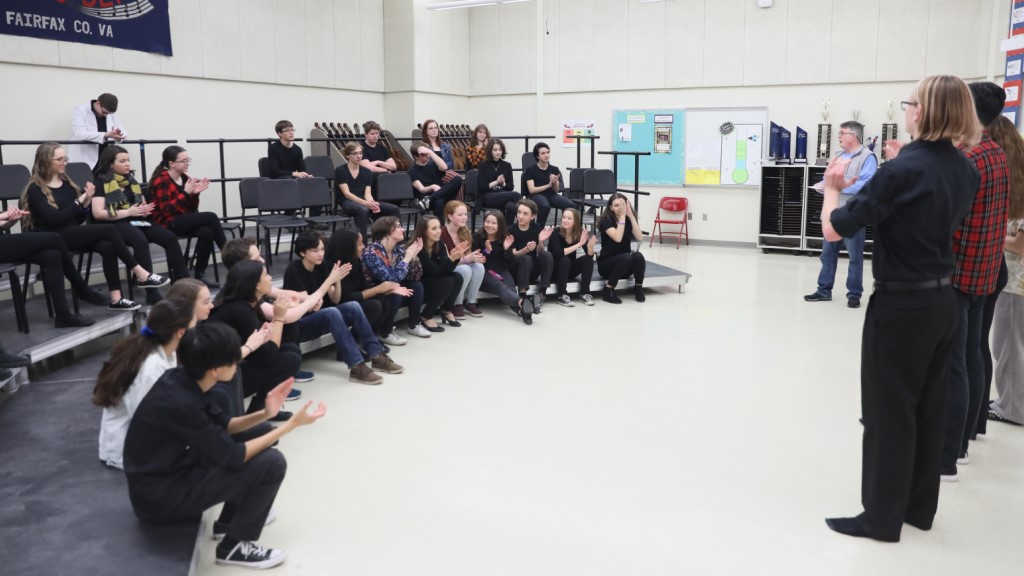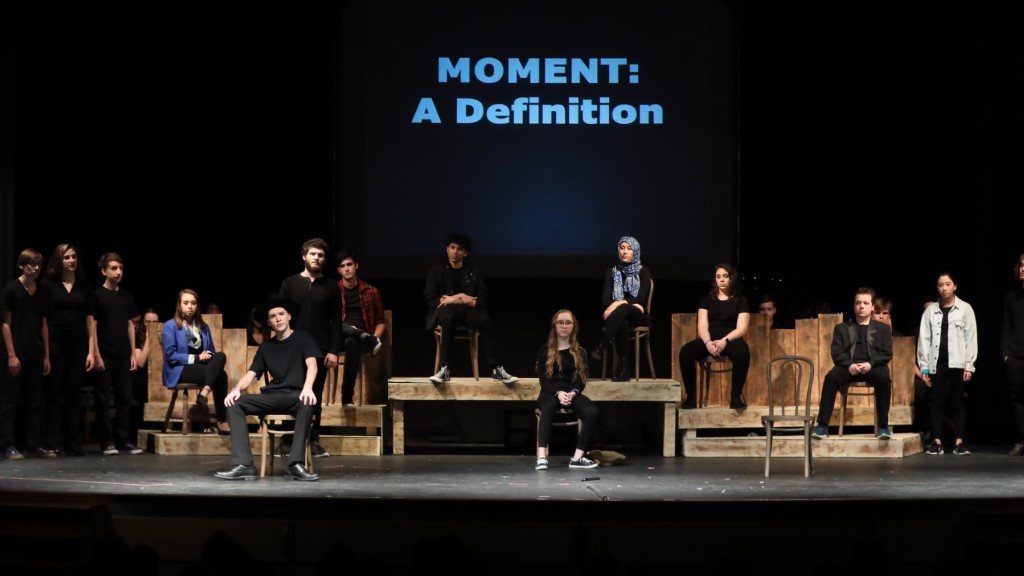Jeff Walker knew staging “The Laramie Project” at Thomas A. Edison High School could be a controversial move, given the play’s subject matter and the fact the school is surrounded by more than 20 churches on a single road.
“When I got here, I tried to put out feelers to find out more about the communities that surrounded our school,” says Walker, now in his third year at Edison, a large comprehensive high school in Virginia’s Fairfax County. “In recent years, they had become used to some fairly standard musicals and plays that dealt with large topics in a classic 1950s or ‘60s sort of style. The productions were good, but they were safe, and I wanted to do something with a little more topical relevance.”
Walker’s decision to do “The Laramie Project,” a documentary- style play on the aftermath of the 1998 hate crime murder of gay college student Matthew Shepard, bucks a trend that has seen high school drama departments shy away from a controversial social topic amid objections over language and subject matter. In a country divided over social and political issues, with the capacity to turn a protest into a national story with a post or tweet, pushing the envelope on a high school stage can be risky.
The list of high school plays and musicals that have been canceled, banned, or protested runs the gamut, from the seemingly innocuous Golden Age classics to modern shows. Over the past two years, productions of Disney’s “The Hunchback of Notre Dame,” “Thoroughly Modern Millie,” “Guys and Dolls,” “Ragtime,” and “To Kill A Mockingbird”—all known and respected titles—have been canceled amid protests and uproars over casting, language, sexuality, and gender.
All this comes at a time when high school theater has entrenched itself in the public consciousness, thanks to popular TV series such as “Glee” and Disney’s “High School Musical” movies. Meanwhile, programs are feeling pressure from students with greater access to current — and often edgier — theater than ever before.

Photography courtesy of Glenn Cook.
Julie Cohen Theobald, executive director of the Educational Theatre Society, says data collected by the organization shows teachers are taking fewer risks and are not picking as many plays and musicals that tackle challenging social issues. Those who do, she says, “are providing some of the best, most memorable, and powerful educational experiences for their kids and their community.”
Teachers doing it well communicate with the building principal, parents, and even the school board. “They are making a point to create an educational experience around it,” Theobald says. “It’s when a teacher takes a risk and does not engage the school board and administration beforehand, that a parent calls three days before, and you see all of these things happen.”
Controversy and buy-in
Since 2000, “The Laramie Project” has been one of the most performed—and most banned—plays in high schools. The show’s frank depiction of Shepard’s homosexuality led to widespread protests of productions by Westboro Baptist Church, the 70-member Topeka, Kansas, church known for its use of inflammatory hate speech, especially against the LGBTQ community.
Walker says the show, now almost two decades old, remains relevant for today’s students. “Laramie,” in fact, has been produced by at least two other Fairfax County schools since 2005. But, given Edison’s traditions, he knew buy-in from administrators and parents was a must.
“I talked to the administration about doing this more than a year ago,” he says. “I told them what I was trying to do, why I wanted to do it, and what our students and community would get out of it. We had a plan, and we didn’t have any problems at all.”
Lisa Landis, president of the Edison Drama Boosters, worked closely with Walker to build support for the show. Parents signed off on permission slips before auditions. Students and parents received links to a YouTube video of the play and had access to the script. The booster club brought in Jeffrey LaHoste, co-founder of the Tectonic Theater Project that developed the play, for a talkback between shows.
“We were very thoughtful as we started going through this project,” Landis says. “It gave the students an opportunity to grow personally and professionally by honing their craft on something that was more than a simplistic kind of theme. To watch these kids go through this, and to see the emotions that came up during the telling of this story, was quite moving.”
Most of the Edison students, Walker says, were not familiar with the play or its subject matter. Several were surprised they would use profanity on stage. “They said, ‘You mean we’re going to say those words?’ And for a minute that did give me pause,” says Walker, who contacted the licensing company about making cuts to the show for language and length. “I thought about it, and then decided to go with it as it was written. The subject matter is too important.”
Theobald suggests more teachers, especially new ones, should take Walker’s approach.
“You need to know what your community can support. When a teacher is new to a school, it may not be best to take a risk in the beginning,” she says. “They have to earn their way there until the administration and community realizes the value for students. Then you can keep pushing the envelope each year.”
'A perfect maelstrom'
When Joe King directed “The Laramie Project” at his Indianapolis high school in 2010, audiences were greeted by Westboro protesters. The show went on as planned, and King says the school board, administrators, and community backed him up.
“We had the support of our administration, and our program skyrocketed because of that,” says King, who left the district in 2012 to take a “dream job” at Wisconsin’s Shorewood High School, a program known for its support of contemporary theater.
King’s predecessor at Shorewood taught for 42 years in the Milwaukee suburb and produced the first high school versions of “A Chorus Line” and “Avenue Q.” King’s first production at Shorewood was an unedited version of “Spring Awakening,” a Tony Award-winning musical that tells the story of teenagers discovering their sexuality.
“I love the Rodgers and Hammerstein classics as much as the next guy, but I also believe contemporary theater tends to speak to younger generations,” says King. “When we did shows like ‘Rent’ and ‘American Idiot’ and ‘Avenue Q,’ it did wonders for bringing newer and younger generations into the musical theater fold. These are the things that kids want to produce.”
King’s long-term goal is to “make the stage look like our school,” so he tries to pick shows that celebrate Shorewood’s ethnic and racial diversity. A 2017 production of “Hairspray” — a musical set at the dawn of the Civil Rights era — did just that.
For the 2018-19 season, King planned productions of “To Kill A Mockingbird” and “Guys and Dolls.” Both shows were canceled before they could be produced; “To Kill A Mockingbird” over its use of the n-word; “Guys and Dolls” because students protested its depiction of women as objects.
“It was the most difficult semester and most difficult year of my 25 years of teaching,” King says. “It was painful and, honestly, it still is. I didn’t want ‘Hairspray’ to be a one and done with regard to getting minority students on stage telling important stories. I thought if I did another story that dealt with important themes that I’d have these kids hooked, and then everyone would stay around regardless of what we were doing.”
King says the drama department “probably underestimated” the impact of the use of the n-word in “Mockingbird,” noting it “was almost certainly because of the white privilege we have and that exists in our community.”
“We wanted to show the horrors and the terrible effects of racial prejudice, but we could not get to that point because the word became the central struggling point for some people in our community,” he says. “The power of Facebook is strong, and it’s important to consider where we are in our country as a whole right now. It was a perfect maelstrom that came together with that production. It turned out to be the wrong play at the wrong time for us.”
Howard Sherman, founder of the Arts Integrity Institute at the New School of Drama and a leading critic of censorship of high school theater, says understanding the context of a show is critical. A handful of complaints taken out of context can derail a production students worked on for months, he says, so schools must do a better job of explaining why the work is of value and what it has to say.

Photography courtesy of Glenn Cook.
“It’s not enough to simply decide to put on a play or musical regardless of whether the show has content that some might chose to view as controversial or problematic,” says Sherman, former executive director of the American Theater Wing, which produces the Tony Awards. “The production of theater in schools is an educational process, and to do that work simply for the fun of ‘Let’s put on a show’ does not take advantage of the opportunities you have to educate students and the greater community about complex and important topics.”
Color-conscious, not colorblind
Daphne Shululu worked in professional theater for two decades before becoming an educator and moving to upstate New York, where she now is director of fine and performing arts for the Ithaca City School District. In 2018, the district found itself in the middle of a firestorm over its casting of the female lead in Disney’s “The Hunchback of Notre Dame.”
Initially, a white female was cast as Esmerelda, even though typically the character is played by a woman of color. The protest, launched by a student group in the district, landed in the local newspaper. Soon after, the story went national.
The controversy forced the show’s cancellation and led to changes in how plays and musicals are selected. Shululu, who was working in another position in the district, was hired to develop guidelines on color-conscious casting as part of Ithaca’s “commitment to cultural responsiveness and inclusion.”
“This was an example of students really voicing what they felt was an oppressive system that from their perspective was racist and sexist,” Shululu says. “It was extremely difficult to watch the controversy unfold for students, staff, and the school board. But we talk about creating critical thinkers, and extracurricular theater programs need to reflect that. Ultimately this proved to be a learning opportunity.”
Ithaca now has a show selection committee for its middle and high schools. Students develop a list of shows they want to see; the committee then uses criteria to determine whether the show meets color-conscious—not colorblind—casting requirements. Ultimately, two shows are put to a vote by the entire student body.
In 2019, students voted for the school edition of “Rent.” This year’s selection is “High School Musical.”
“We’re providing students with a voice, and what they commit to is also a directive to us as to what they want,” Shululu says. “Typically, a director selects a show, and then students who want to do it audition. There’s never a discussion about the actual message of the show, or what we’re giving to the audience in terms of teaching them something about our belief systems.
“Theater, ultimately, is social commentary. It’s not just about the performance at the end. Now, if there’s any criticism for what’s produced, we’ve taken a lot of time to make conscious decisions, not at a superficial level but in a substantive way. It’s really, really powerful.”
Paper plates, paper hearts
On the Saturday before Thanksgiving, the cast and crew of “The Laramie Project” sit in a circle, eating dinner between shows. Before the break ends, each student stands up, makes a small speech, and then gives one classmate a Shining Stars gift.
This final show ritual is a tradition at Edison, organized and run by seniors, that predates Walker’s arrival. After the play ends, students exchange paper plate awards, another longstanding tradition.
Walker hangs back and gives the students their time. He strolls around the theater, accepting compliments from parents and community members about his handling of the play. The talkback featuring LaHoste was a hit as well.

Photography courtesy of Glenn Cook.
Sitting at the drama boosters table, where information about “Laramie” and the Matthew Shepard Foundation is laid out, Landis talks about the play’s impact on students and audience members. She points to the paper hearts that line a fence in the theater lobby, all with kind words written by audience members.
Landis describes how the mother of two adult gay sons drove by the school, saw the banner advertising the show, and offered to bake cookies for the cast. The mother also bought an opening night ticket.
A few minutes pass and it’s the half-hour call. Students go to the choir room where Walker addresses the cast and crew: “I hope you’ll all take something away from this. It may not be right now, and it might not be for a long time, but I hope you’ve gotten something from being part of it,” he says.
The students applaud. And then the show goes on.

Share this content